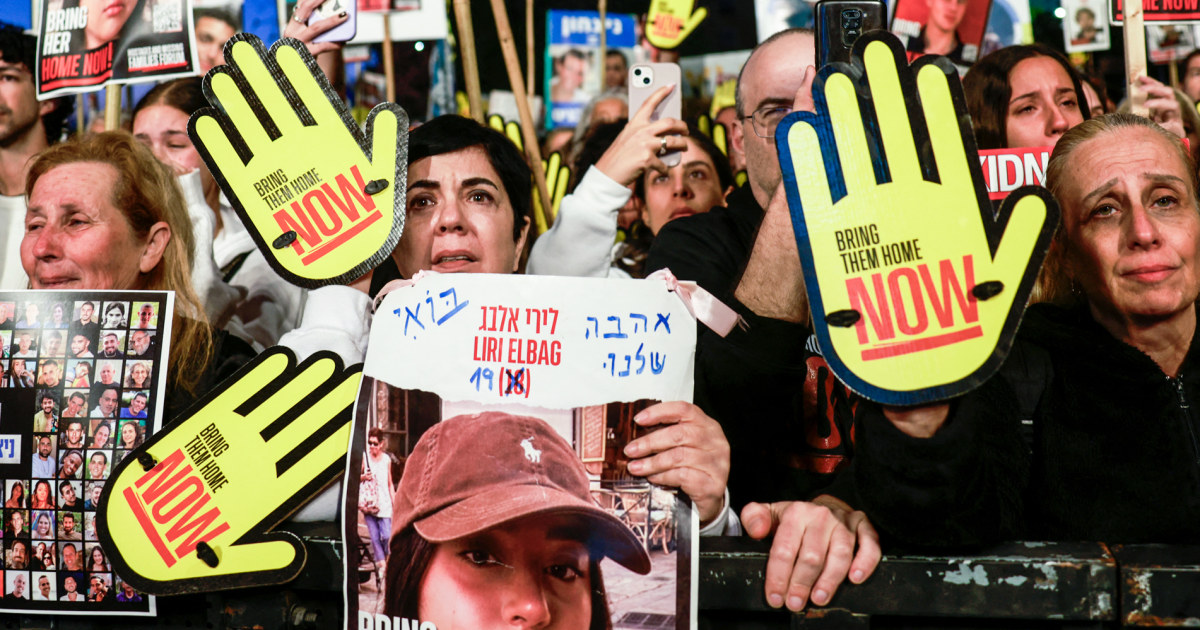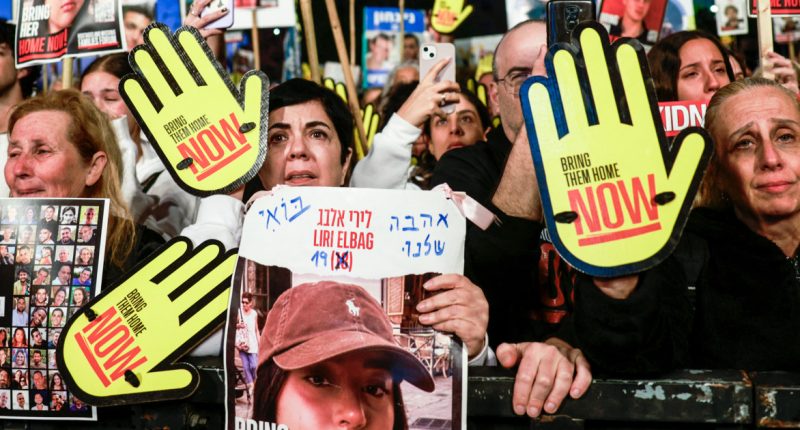
More than six months since Hamas militants attacked Israel and seized more than 250 hostages, it remains unclear exactly how many of the captives are still alive in Gaza, according to U.S. and Israeli officials.
The uncertainty has caused anguish among the families of those held in Gaza and undermined international efforts to negotiate a cease-fire deal and the release of at least some of the hostages, the officials told NBC News.
A proposed cease-fire formula calls for Hamas to free 40 hostages who are women, children or sick and elderly men, and in return, Israel would release possibly hundreds of Palestinian prisoners. But Hamas so far has been unable to confirm it has identified 40 hostages who meet those criteria, and that has bogged down the negotiations, U.S., Israeli and Western officials said.
In November, more than 100 hostages were released as part of a four-day pause in the fighting in Gaza. Israel says more than 130 hostages remain, and about a quarter of those are believed dead.
Far fewer hostages may be alive than is publicly known, but it is difficult to say for certain, given there has been limited visibility into the locations and conditions of some of the hostages, U.S. officials said.
Asked whether there was a firm estimate of how many hostages remained alive, a former senior Israeli official said: “Not at all. No one reliable has this information. It’s all speculation.”
U.S. officials accused Hamas of making demands that it knows are unobtainable.
“Hamas’ refusal to accept a hostage-cease-fire deal shows their disregard for the lives of the Palestinian people,” a senior Biden administration official said Wednesday. “They started this war and seem to be perfectly fine with this conflict continuing.”
An Israeli official said, “Hamas is dragging its feet, is not interested in a deal and continues to hope for a regional escalation, which is why the negotiations remain stalled.”
Hamas said in a statement Saturday it was prepared to sign on to a “serious and true” deal but renewed its demand for a permanent cease-fire and a full withdrawal of Israeli troops.
According to Qatar’s prime minister, Sheikh Mohammed bin Abdulrahman Al Thani, whose country has acted as an intermediary for the hostage-cease-fire talks along with Egypt and the U.S., the talks have hit a “stumbling block.”
“We are passing through a delicate phase with some stumbling,” he said at a news conference Wednesday, without elaborating. “We are trying as much as possible to address this stumbling block and to move forward.”
A relative of one of the several Americans believed to be held in Gaza said families are in the dark about the fates of their loved ones: “For 185 days, we have received no verification of life of any of these hostages — absent a limited number of videos released early on by the Hamas terrorists.”
The family member, who spoke on condition of anonymity to avoid putting their loved one’s fate at risk, said that Israeli security has shown Americans who have traveled to Israel and met with Israel’s security forces that they know where many of the hostages are but that the captives are constantly being moved.
“Every day they are there, we also know that they could die of starvation, illness, injury or murder,” the relative said.
The Biden administration is working under the assumption that five U.S. hostages are still alive and unaccounted for, a U.S. official said. But Washington has better visibility into the locations and conditions of some hostages than others, making it difficult to say with any certainty that all five remain alive.
Beyond the five, the U.S. believes Hamas is holding several more bodies of Americans believed to have been taken into Gaza after they were killed in the militants’ Oct. 7 assault on Israel or shortly thereafter.
Israeli troops have searched hospitals, tunnels and even graveyards in Gaza for hostages or their remains. In February, an Israeli raid in Rafah in southern Gaza rescued two hostages.
Aviva Siegel, who spent 51 days as a hostage in Gaza until she was released as part of the November deal, said her experience in captivity was a terrifying nightmare.
“For 186 days I was there. I was treated like I’m nothing. I didn’t have any human rights. We weren’t allowed to talk. We weren’t allowed to even stand,” Siegel told NBC News’ Andrea Mitchell last week.
“They used to starve us and eat in front of us. They used to drink water, and we begged them for water. They used to sometimes bring us just a little bit of water and say that’s the water until tomorrow at 5 o’clock. So we used to have one sip every couple of hours, each of us.”
Her husband, Keith, of North Carolina, remains captive.
Source: | This article originally belongs to Nbcnews.com









